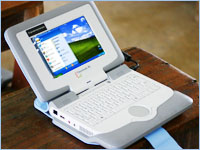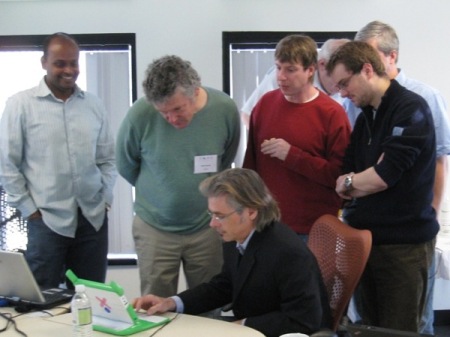Tutorial explains programming OLPC Sugar with Python
Jan 18, 2008 — by Eric Brown — from the LinuxDevices Archive — 14 views IBM DeveloperWorks is hosting a free online tutorial on using Python to develop for the Linux-based One Laptop Per Child (OLPC) platform. In other OLPC news, Joel Evans has posted some tips on hacking the OLPC's XO laptop, and Intel dropped out of OLPC.
IBM DeveloperWorks is hosting a free online tutorial on using Python to develop for the Linux-based One Laptop Per Child (OLPC) platform. In other OLPC news, Joel Evans has posted some tips on hacking the OLPC's XO laptop, and Intel dropped out of OLPC.
Called “Application Development for the OLPC Laptop,” the DeveloperWorks tutorial shows how to program an activity for the XO-1 laptop's Sugar application environment. The intermediate-level, two-hour course promises to explore the Sugar application programming interfaces (APIs) on the XO-1 (pictured at left) and show how to develop and debug a graphical activity in Sugar using Python. Taught by M. Tim Jones of Emulex, the course is designed for Linux developers who are familiar with the Linux shell and have a basic understanding of Python.
Hacking the XO
Meanwhile, over on geek.com, Joel Evans has posted a story about his recent experiences hacking the XO laptop with Brian Jepson of HackZine and O'Reilly Publishing. Connecting their two mesh-networked XO's via WiFi at a local Panera coffee shop, the two linked up with XOChat.org, an ejabberd (Jabber/XMPP) open source instant messaging server. To start chatting with other XO users they simply entered the Terminal application and typed: $ sugar-control-panel -s jabber xochat.org.
Next, Jepson hooked up a homemade pressure sensor to the XO using a 10k resistor and an LED for output, and using the 5-volt USB port as a voltage source. The XO dutifully displayed the pressure waveforms. For an encore, Evans and Jepson loaded the Opera browser on the XO by creating a nested X server using Zephyr. Evans suggests that wannabe XO hackers check out OLPC's XO wiki.
More controversy at OLPC
 Intel's Classmate PC |
Based at the MIT media lab in Cambridge, Mass., the OLPC project is starting its third year. It briefly offered the laptop for sale in the U.S., in a scheme in which consumers could buy two of the $200 laptops if they agreed to donate one of them to poor children overseas. The promotion will likely be returning, says Joel Evans, yet OLPC's chief mission continues to be selling its low-cost, open source laptops to governments of developing countries at discounted rates, with the agreement that they be given away free to children and schools.
Mass production on the XO-1 laptops started in November, and they continue to roll out around the world, albeit at a slower pace than expected. Yet, the high-tech soap opera continues here at home, with Intel leaving the OLPC board amid allegations from both sides. Since Intel's surprising news that it was joining the OLPC board in July, despite marketing its own low-cost Classmate PC in many of the same developing countries that are testing the XO-1, the relationship has been rocky. After the OLPC accused Intel of subverting OLPC sales overseas in favor of its Classmate PCs, and of failing to contribute anything to the project, Intel quit the OLPC board earlier this month, claiming that it was OLPC that was trying to stop Intel from selling the Classmate.

Microsoft and OLPC: Playing nice or playing too nice?
Microsoft's John Gunabal (left) and Bohdan Raciborski (front) demoing Windows XP on the XO to
OLPC's Walter Bender (in green), Richard Smith (in red), and Ivan Krstic.
(Picture via Microsoft's James Utzschneider. Source: Ivan Krstic's radian.org)
(Click to enlarge)
Meanwhile, things are proceeding more smoothly with another new and unlikely OLPC “ally,” Microsoft. The two organizations continue to work on a scheme for loading Windows XP on the XO-1. Yet controversy swirls here, too, with some Linux developers claiming the OLPC had sold out to Redmond. In a recent posting, OLPC director of security architecture Ivan Krstic denies the accusations and claims that Microsoft is playing by the rules. He also says the OLPC is ensuring that it will be easy for users to switch back to Fedora Linux after an XP installation.
Availability
Registration information for the IBM DeveloperWorks online course on programming OLPC's Sugar with Python is available OLPC "Give 1, Get 1" promo starts Nov. 12 in the U.S.
This article was originally published on LinuxDevices.com and has been donated to the open source community by QuinStreet Inc. Please visit LinuxToday.com for up-to-date news and articles about Linux and open source.